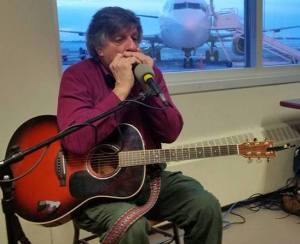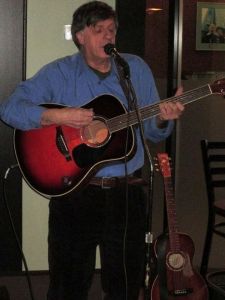He brings to his music a rare realness, quiet humour, and thoughtful consideration of the world around him.
The following article appeared in the Yellowknifer on February 12, 2014.
Musician Jonathan Churcher completes residency at Banff Centre
Churcher works on album and prepares for live shows in 2014
Sarah Bradfield
Northern News Services
Published Tuesday, February 11, 2014
SOMBA K’E/YELLOWKNIFE
Musicians and artists understand the sobering experience of creative droughts.

Singer/songwriter Jonathan Churcher is currently working on an upcoming album in his at-home studio. Churcher will be bringing his gift of musical storytelling to different venues throughout February and March. – Sarah Bradfield/NNSL photo
|
Akin to a common cold, they can be frustrating, but typically run their course naturally. And for some lucky artists, inspiration comes in like a roller wave – quickly and without warning.
Like most artists, Yellowknife singer/songwriter Jonathan Churcher has felt the repercussions of this dreaded inspirational black hole.
“Whenever I sat down at a guitar, nothing that came out of it was of any interest. I thought, “well I’m just wasting my time – I just put it aside,’” he said.
However, Churcher’s musical inspiration came knocking in 2005 when he was living in Inuvik, and has since led him along his musical path.
November to December of last year, Churcher enrolled in the Banff Centre’s prestigious artistic residency program with roughly 30 other musicians and countless other artists. Claiming to be the “largest arts and creativity incubator on the planet,” the Banff Centre works to support artists in pursuit of their artistic goals. The centre has an international reputation for excellence that has recently become more inclusive.
“I don’t speak for the Banff Centre, of course, my experience is subjective,” said Churcher.
“New policies are for it to be more inclusive by accepting different kinds of music. That’s the big eye opener for me. I thought it was for the super elite, high class performers, but now it’s open to all sorts of people, singers, songwriters, jazz musicians, et cetera, of all levels.”
The programming is divided into winter, spring, summer and fall sessions and the centre boasts that it attracts 8,000 working artists every year. Churcher enrolled hoping to have a larger question answered, and was able to find his answer after extending his stay by two weeks.
“I wanted to go outside of Yellowknife and show people what I do to see what response there was. Should I quit, or not?” Churcher modestly answered, “the feedback was positive, and so that has given me the momentum to continue.”
According to Churcher, the motivation to create music comes from an inner place, but the purpose to continue to create music has to do with how it feeds into the lives of other people.
“I can stay at home and play for myself in the mirror, but that’s not the rationalization. The rationalization is: ‘is this of value to anyone else? to something beyond myself?’ Because of our low population, not everyone can hear what a musician is doing. If you want art to be a big part of your life then more people need to see it,” he explained.
Churcher reveled in the opportunity to work in a distraction free, in-room studio. According to him, in an atmosphere where everyone is industriously following their own artistic pursuit, everyone is positive and encouraging.
The official reason for Churcher’s enrollment in the program was to continue to work on an upcoming album – which is still in the planning stages. Fans of Churcher can expect him to stay true to his storytelling roots, through which he spans a variety of national and international themes.
“One song is about global warming and another about the power of unconditional love. One song is about the coal mine disaster in Nova Scotia, and another is about a Russian family. Some are written and some are covered. My interests are quite broad, and they all come from a storyteller point of view. Whatever resonates with me, I gravitate to, and that’s how I proceed.”
Aside from working on his album and having the space to focus on his work, Churcher explored the difference between an artist and a performer.
“I was looking into physical stage presences, like how you perform. What is the performance element? This was something else I wanted to work on. What was the best thing I could do on stage? What it comes down to is to be able to have a guitar and sing, but to also be able to put down and play sax or harmonica using looping.”
Churcher was able to explore this beyond theory at a performance in a local church in the town of Banff.
“The acoustics were great and people were there just to listen. That was a high point – to be in front of an attentive crowd is a luxury. To have an audience hanging on every note – that’s a great test of an artist.”
At the end of the residency, Churcher felt refreshed and he urges other artists to see if the Banff Centre residency would work for them.
“The end product was a dedication on my own part to continue with music as I am doing it. I came out motivated, encouraged and supported, and that’s why I’m continuing. I think there are some things I may be able to contribute to music and I’m pursuing that right now.”
Churcher will be sharing his gift of storytelling Feb. 26 through the Yellowknife Artist Run Community Centre (YKARCC). He will also be playing at the Snow Castle on March 16.
“Music comes and goes in waves in my life, and sometimes the energy is strong and sometimes it’s dissipated. Now it’s really strong and I’m taking advantage of that momentum as much as I can. I don’t know where this wave of musical energy is headed for and I don’t know on which shore it’s going to crash.”
Sixteen years of Javaroma Jams
Robin Grant Northern News Services
Friday, November 25, 2016
SOMBA K’E/YELLOWKNIFE
For 16 years, Saturday night jam sessions at Javaroma have been helping aspiring musicians pursue their dreams. The venue has provided a training ground for newbie musicians who have gone on to make a name for themselves in the Northern music industry. Some of those names – folk and blues singer Greyson Gritt and singer-songwriter Jesse Gon or Diga Wolf – have become well-known fixtures in Yellowknife.
Singer-songwriter Jonathan Churcher has been hosting java jams for years. He said the weekend event provides a much needed stage for aspiring artists to learn skills and manage nerves.
“The more inexperienced the person is, the less opportunity they have to perform in front of not necessarily an appreciative audience, but a sympathetic one,” he said.
Churcher described open-mic venues in general as “embryonic zones” where artists can begin to improve their skills.
“I call them ‘no-attitude’ venues. The audience understands that some performers are going to be new and not particularly skilled, and, at the same time, you get people who have been performing all their lives,” he said.
Javaroma Jam was founded in 1999 by Marino Casebeer out of what he called an intense love for music. He recruits hosts and Javaroma pays a $50 honorarium for hosting the night. Interested musicians sign up to perform. In his youth, Casebeer said he developed an appreciation for how having music in his life has enhanced his “personhood.”
“Part of my purpose with this tenacious dedication to this jam is to provide a venue for people to have some musical expression outside the confines of their shower or bedroom or living room,” he said.
In the beginning years, he said many local professional musicians came out and performed
regularly, so there was “sort of a counter-balance between youth and emerging musicians and more seasoned veterans to sort of mentor and mix,” he said.
But popularity for the event has begun to wane in recent years. In early October, Casebeer
invited Northern-based singer-songwriter Indio Saravanja to host a jam session in an effort to attract more people. That night, Javaroma was packed with an eager audience.
“These kinds of open mics are so important for young people who are interested in playing music publicly and maybe pursuing a career,” Saravanja said. “There was a time in my young life when I would go to them – one to three times a week in cities like Toronto, Montreal and New York. I made lifelong connections and learned how to perform under pressure … Competition was fierce.”
He said it is “cool” the scene still exists today as a transition between amateur and professional. “I was very impressed with some of the young people there … I hope more people pitch in to make it even stronger.”
Javaroma co-owner Fadil Memedi said the weekly event contributes to keeping local talent
alive in the city and attracts guests looking for an alternative to drinking in bars.
“It’s a place for artists to come and express themselves,” he said. “Also it’s giving everybody a place to come in and enjoy the night who might not necessarily want to be in a loud bar or for people who don’t drink.”
Sixteen-year-old Shiri MacPherson has been attending Java Jam for years and now takes on the task of hosting the event on occasion.
“One of the biggest things I noticed is how shy first-time performers are and now I see them all those years later and they’re like famous around town and playing at the all the events,” she said. “So that is one of the big things I learned – that everyone starts somewhere.”


